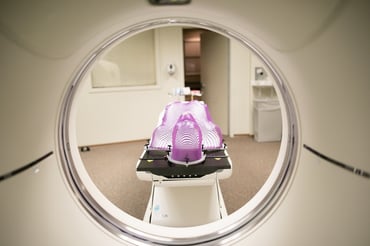
Once you receive a head and neck cancer diagnosis, you probably have questions about your condition and what to expect next. Asking questions is a great way to learn more and could even put some of your worries at ease. While your oncologist, who is the leader of the cancer care team, will go over the information that you need to know, it's always a great idea to have a few questions prepared so that you can be an active participant in your treatment process.
Remember, communicating with your healthcare team is important and helps you stay informed about your health and future. The suggested questions are intended to jump-start the conversation with your cancer care team. Ask the questions that matter the most to you. Everybody is unique, and your concerns may be specific to your lifestyle. Keep in mind; it's also helpful to take notes during your appointments so you can look back on the information you gathered.
Here are a few questions that we think can be useful to understand head and neck cancer.
Initial Diagnosis of Head or Neck Cancer
Depending on the type of head or neck cancer, there are specific questions that might apply to you. It helps to learn as much as possible about your particular cancer, including where it's located, the size, and how advanced it is.
Questions to ask after getting a diagnosis:
- Head and neck cancer refers to tumors that are located in and around the head and neck area, including the throat, larynx, mouth, nose, and sinuses. Which type of head and neck cancer do I have?
- Where is the tumor located? The location of the tumor may play a critical role in the treatment and recovery process.
- What stage is the cancer? What does this mean?
- Do we know if the tumor was caused by the human papilloma virus (HPV)? If so, does that change how it’s treated?
- Should I get a second opinion? How do I go about getting one?
Deciding on a Treatment Plan for Head or Neck Cancer
Your oncologist will make a recommendation for what they feel would work best based on the cancer type and stage as well as your overall health condition. There may be some choices about your treatment plan that you’ll be asked to make. Understanding the answers to the following questions will make you more informed as you make decisions.
Questions to ask about treatments and their side effects
- What treatment plan is recommended for me and why?
- Is a clinical trial a good idea for me? If so, how does the clinical trial process work compared to the standard treatment options?
- How will you know if the treatment is working as it’s supposed to?
- Will my speech be affected by the surgery or treatments?
- Will I be able to swallow normally?
- How will this treatment affect my daily life? Will I be able to work, exercise, and perform my usual activities?
- Could this treatment affect my sex life? If so, how and for how long?
- Could this treatment affect my ability to become pregnant or have children? If so, should I talk with a fertility specialist before cancer treatment begins?
- Should I see a speech-language pathologist before starting treatment?
Questions about how the team is organized
- Who will be leading my overall treatment plan?
- Are there other doctors involved in the treatment process? If so, who?
- Do I need to see a dentist who specializes in cancer care?
- Who is my point of contact at the practice if I have questions?
- Who do I ask about the cost of care?
- What support services are available to me?
- Are there any support services available to my family?
Surgery for Head or Neck Cancer
Surgery is a part of the treatment process for most patients with head or neck cancer. This is so that cancerous tumor can be removed. It's important that you know what you should expect before, during, and after surgery so that there are no surprises along the way.
Questions to ask about having surgery
- Will you need to perform surgery?
- How is the surgery performed?
- Who will perform the surgery?
- Will any lymph nodes need to be removed? Will this affect my health in the future?
- How long will the operation take?
- Will I need to stay in the hospital?
- How long should I expect for a typical recovery time? Knowing this information will help you plan accordingly and put in place any additional support you may need during this time.
- Who is my point of contact if I experience any side effects?
- What are the possible long-term effects of having this surgery?
- Will this surgery affect my speech or ability to chew and swallow?
- Will this surgery affect my appearance?
- Will I need to have reconstructive surgery to replace lost tissue?
Radiation Therapy and Medical Oncology Treatments for Head and Neck Cancer
Other treatments are often needed, depending on the stage of the cancer. These include radiation and systemic therapies. The most common systemic therapy is chemotherapy, but other types of treatments such as immunotherapy can be considered systemic. It's important to learn what these treatments are and the potential side effects. Any head or neck cancer treatment is going to be a journey, and it's helpful to understand the process from start to finish.
Questions to ask about having radiation therapy or systemic therapy using medication
- Do I need to have chemotherapy or another systemic cancer treatment?
- Do I need to have a port put in place for my chemo treatments?
- What is the goal of each treatment? For example, sometimes, the goal is to shrink a tumor before surgery. Other times it's to be sure all cancer cells are killed in the area around the surgery site. And in some cases, the goal of treatment changes as time goes on.
- What type of radiation treatment is recommended, if any?
- Will radiation therapy be given with external or internal radiation?
- Where would I receive my treatments?
- How long will I need to continue this treatment? Knowing the length of time for each treatment session and how many sessions you're likely to need will help you with planning your day-to-day routine.
- What are common side effects and complications? Are they short-term or long-term side effects?
- Is there anything I can do to prevent or minimize these side effects?
Follow-Up Care Questions
Once you've completed head and neck cancer treatment, you must still complete follow-up care. Follow-up care can look a little different for everybody, so it's important that you know what your cancer care team expects. Most cancer survivors need to come in for periodic checkups, tests, and scans.
Questions to ask about planning follow-up care
- Will I need physical therapy, speech therapy, or another type of rehabilitation after finishing treatment?
- What is the chance that the cancer will come back? Should I watch for specific signs or symptoms?
- What long-term side effects or late effects are possible based on the cancer treatment I received?
- What follow-up tests will I need, and how often will I need them?
- How do I get a treatment summary and survivorship care plan to keep in my personal records?
- Who will be leading my follow-up care?
- What survivorship support services are available to me?
- Are there any support services available to my family?
At Radiotherapy Clinics of Georgia, we are committed to providing information and resources to each of our patients. Use the above guide during your scheduled visits to help you communicate better with your cancer care team. In some cases you may have a few different appointments, with various doctors on the cancer treatment team. Feel free to ask the same questions to hear their answers as well.
If you have been given a cancer diagnosis and told you will need radiation therapy, or you’re looking for a second opinion about the use of radiotherapy for your cancer care, request an appointment with one of our head and neck cancer specialists in the Atlanta area.


